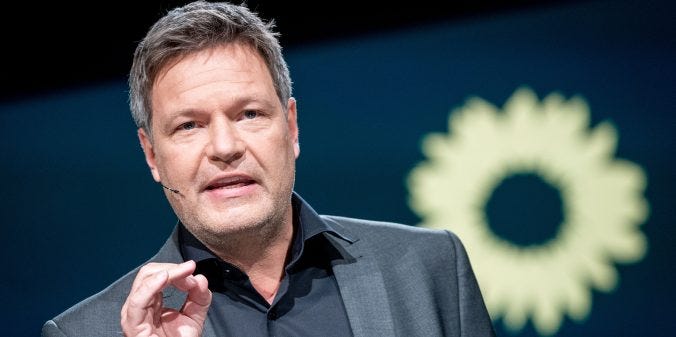What follows is my English translation of a short article originally in Italian, published on Movisol.org on Monday 25th November 2024.
In recent days, there have been disastrous headlines about the pilot projects of the “green transition” of the German economy. It was only a few days ago that news broke of the insolvency of Hamburg-based company HH2E, which Economy Minister Robert Habeck (Greens, photo) had counted on to start “green hydrogen” production in the country. The plug was pulled when the majority shareholder since May, the London-based Foresight Group, withdrew funding for the hydrogen programmes. Until then, HH2E’s perspective was to produce up to 240,000 tonnes of “green hydrogen” by 2030 with electrolysis based on solar and wind energy at four production sites. This was supposed to be the first major step towards the creation of national replacement capacity for coal and gas for the production of “green steel”, for transport infrastructure and for other sectors of the economy.
Bad news is also almost daily for the automobile industry: at Volkswagen [VW] and Audi (both belonging to the VAG group), dramatically low sales of electric cars are forcing management to reduce production, introduce part-time work and close production sites, most likely three at VW and at least one at Audi. Ford in Cologne, which stopped producing cars with endothermic engines and invested € 1.8 billion in the exclusive production of e-SUVs, expected high profits. Instead, sales of the Explorer SUV got off to such a bad start that for every car sold for € 49,000, the company made a loss of € 44,000. Management pulled the emergency brake, once losses rose to € 1.3 billion in the third quarter of this year, and decided to reduce daily production from 630 to 480 vehicles, to produce fewer days a week and to adopt part-time work. The dream of green ideologues, who, in euphoria, already saw 15 million electric cars on the road in Germany within the next decade, has been shattered. In reality, there are not enough potential buyers who can afford the high price of an electric car and who have charging facilities, nor enough charging stations available to instil confidence in those who might buy one.
In addition, car manufacturers have drastically reduced hiring in their research and development departments: 57 per cent less in January-October 2024 compared to the same period in 2023. This sends the worrying message that new models are not being developed seriously. The automotive sector, which was already expecting to lose around a third of its 780,000 jobs due to the transition to an electric mobility future, will be forced to make more redundancies as the latter collapses. And it goes without saying that the countless supplier companies, with another hundreds of thousands of jobs, will also be dragged into the downward spiral of the car manufacturers.





MAGA through Deindustrialization of not only Germany but all of Europe. Europeans are taught Russia,China , BRICS+ , ALTERNATIVE CURRENCY TO AMERICAN DOLLAR BAD(Threat of 100% Tariffs by TRUMP if USD dropped ).
G'day Ismaele, do I perceive that evs are not your cup of tea and yes Germany is not such a sunny place for pv power yet here in Australia an ev is a free to run car with the standard of today's home roof mounted solar system. We get free power and sometimes a credit on our power bills so solar is amazing.
Captivated politicians are something that you most probably were going after re Die Grune but please we only have one jannah.